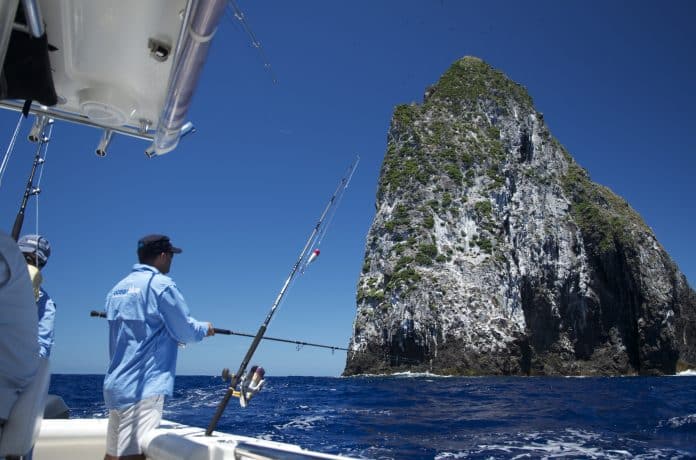If you’re chasing warm water, glassy mornings, and fast pelagics, fishing in Vanuatu September to December is prime time. As spring rolls into early summer, sea temps stabilise in the 27–29°C zone, bait pushes tight to the islands, and bluewater predators light up the edges. This guide breaks down water conditions, why the bite accelerates, the species to target, the techniques that consistently produce, and why an Ocean Blue Fishing Adventure turns a great trip into an unforgettable one.
Why September–December Works
- Sea Temps: 27–29°C — ideal for marlin, yellowfin, and wahoo
- Air Temps: 28–32°C days; humid evenings with that tropical vibe
- Winds: Trade winds ease; calm glassy mornings offshore are common
- Rain: Short tropical showers increase towards December
- Result: Clear water, concentrated bait, predictable pelagic activity
Water Conditions in Vanuatu: September to December
- Temperature profile: The thermocline rises, placing bait and predators in more accessible strike zones for trolling, casting, and jigging.
- Clarity: Visibility improves on the leeward sides and along current lines; perfect for topwater presentations.
- Currents: South Equatorial Current and local eddies create nutrient “highways,” stacking anchovy, flying fish, and small mackerel along drop-offs and FADs.
- Boat days: Calmer mornings mean more productive lines in the water and safer runs to seamounts and ledges.
Why Vanuatu Fires in Spring–Summer
- Warming seas: Blue marlin, yellowfin, and wahoo shift into peak feeding temperatures.
- Bait aggregation: Dense baitballs push tight to reefs and current edges, inviting ambush predators.
- Structure advantage: Volcanic drop-offs, seamounts, and reef edges concentrate dogtooth and GTs within striking distance.
- Surface signs: Tuna bust-ups, marlin tailing down-sea, and wahoo slashing along contour lines are frequent.
Target Species When Fishing in Vanuatu September to December
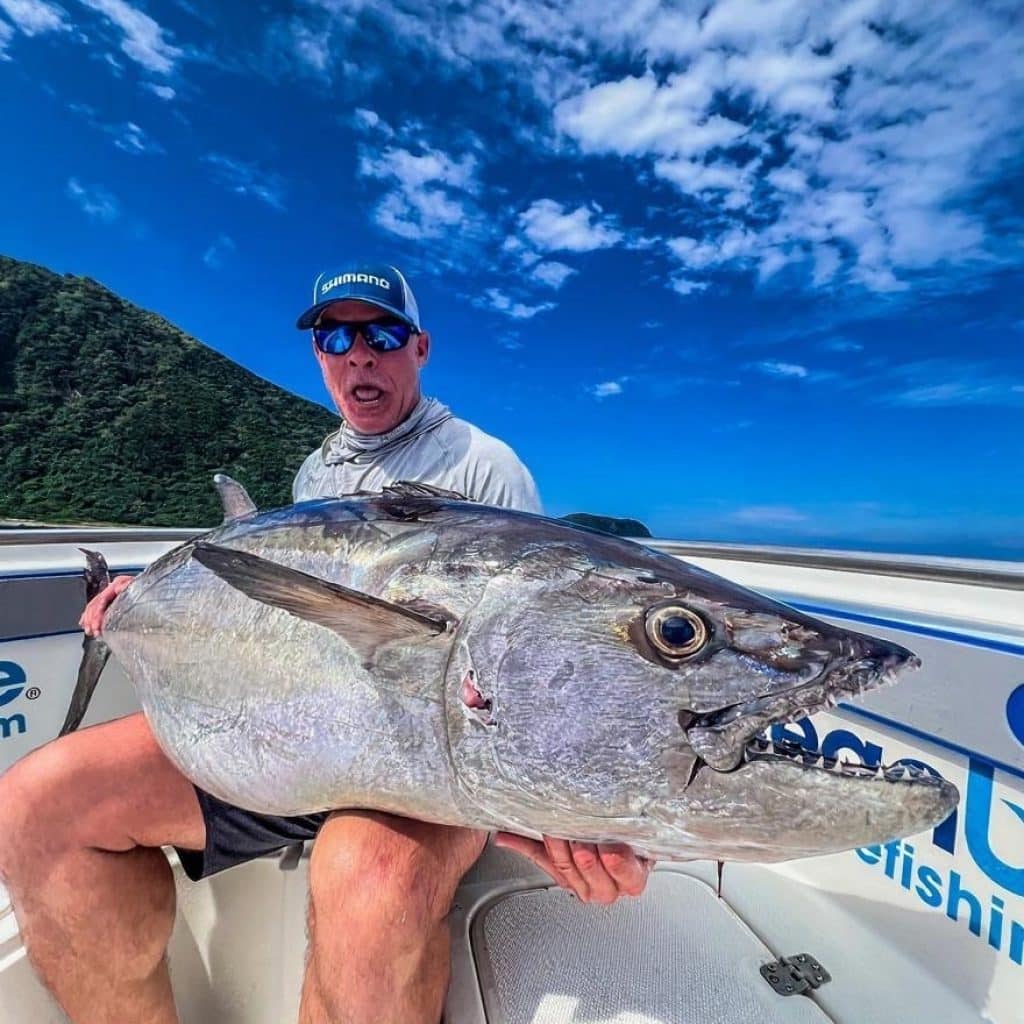
Blue Marlin
- Why now: Stable 27–29°C temps pull larger fish in.
- Where/how: Work drop-offs, bait edges, and current lines with a mixed spread.
- Tactics: 6–8 inch skirted lures, jet heads, and a switch-bait routine for converters. Keep pitch baits ready.
Yellowfin Tuna
- Pattern: Increasing size and school consistency through spring into early summer.
- Where/how: Offshore bust-ups, FADs, birds. Match-the-hatch stickbaits and poppers; troll small skirts when they’re deep.
- Tip: Knife jigs under birds when the surface shuts down.
Dogtooth Tuna
- Year-round but charged by warmer currents.
- Where/how: Seamounts and steep drop-offs. Vertical jigs, live baits, and controlled drifts.
- Gear tip: High drag, abrasion-resistant leaders, and short, brutal fights — doggies don’t give freebies.
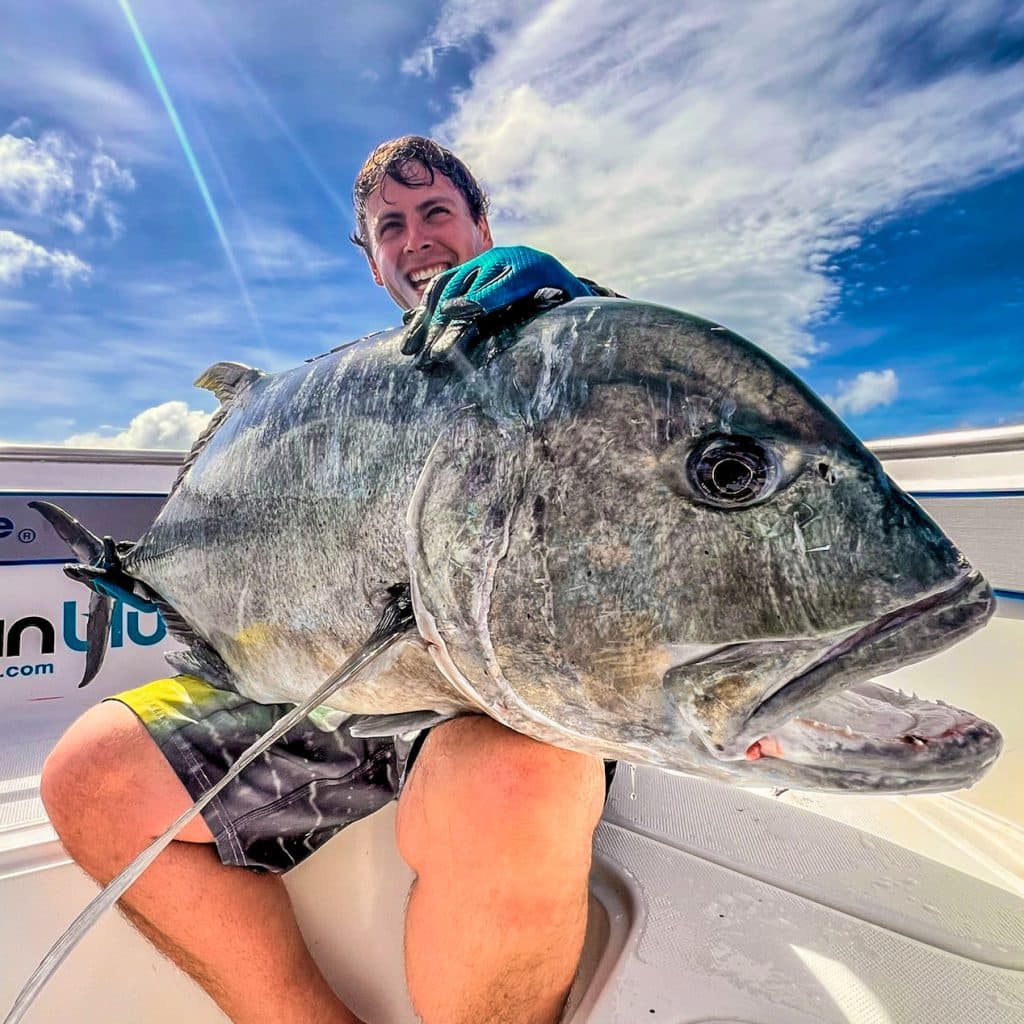
Giant Trevally (GT)
- Spring heat wakes the shallow edges and bommies.
- Where/how: Cast big poppers and stickbaits along reef lips, pressure points, and wash zones.
- Retrieve: Mix long sweeps with explosive pops; pause to trigger follows.
Wahoo
- Plentiful early in the season; lightning-fast strikes at speed.
- Where/how: High-speed trolling (12–18 knots), resin heads, diving minnows, and wire where needed.
- Boat craft: Big s-turns to trigger edge bites; keep hands clear at the gaff.
Sailfish & Mahi-Mahi
- Present through September–October around current lines and FADs; tapering by December.
- Presentations: Smaller skirts, strip baits, and live baits on the edge of baitballs
Techniques That Produce in September to December
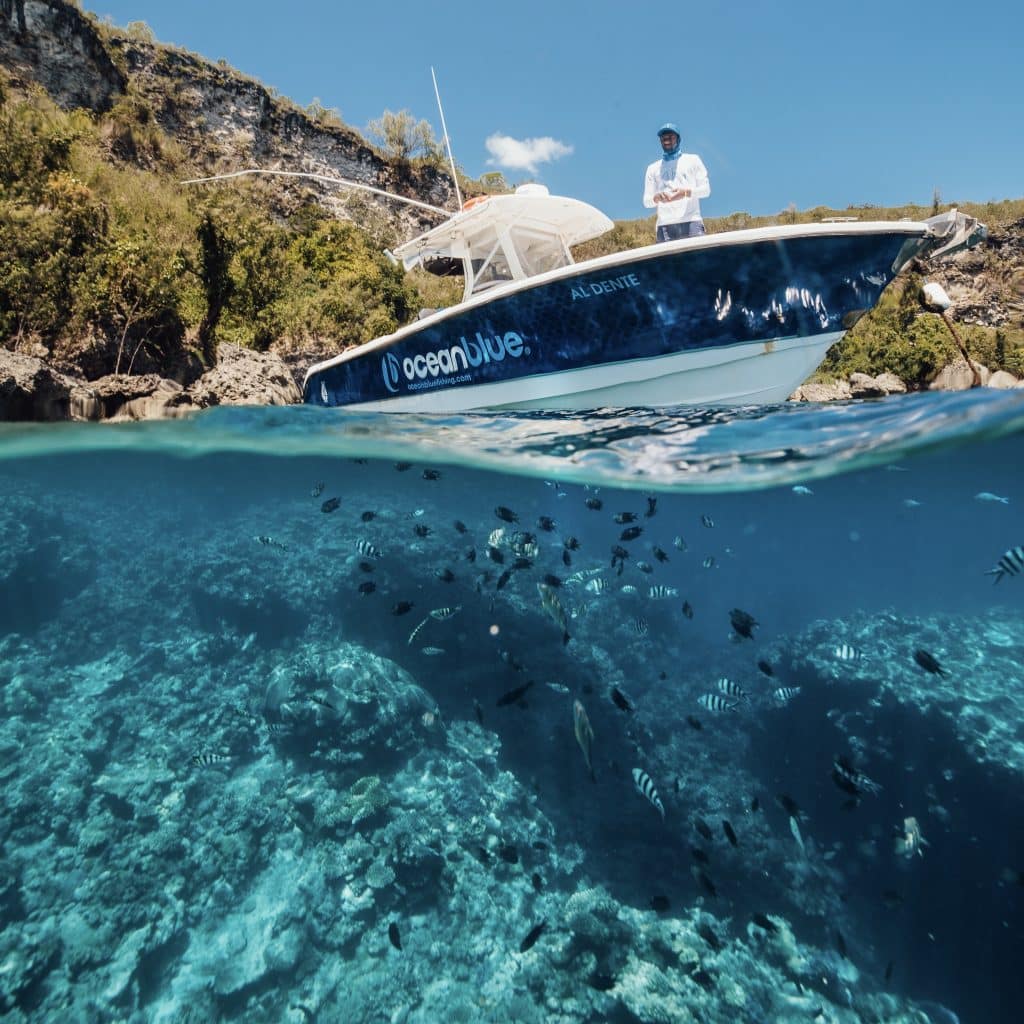
Trolling for Marlin and Wahoo
- Spread: Two long skirted lures, two shorts, and a shotgun or teaser chain.
- Speed: 7–9 knots for marlin; bump to 12–18 knots for wahoo lanes.
- Switch-baiting: Run a teaser and pitch rigged baits when fish window-shop.
Casting Poppers and Stickbaits
- Targets: GTs, yellowfin, mahi along edges and current tongues.
- Gear: PE8–10 for GTs, heavy leaders; PE4–6 for tuna with mid-size stickbaits.
- Retrieve: Loud pops for reaction strikes; sweep-and-glide for wary fish.
Vertical Jigging the Drop-Offs
- Targets: Dogtooth, amberjack, and midwater tuna.
- Setup: 200–400g jigs depending on drift; assist hooks with solid rings and kevlar.
- Tip: Map the drift and reset above the strike line; doggies punish sloppy angles.
Live Baiting the Pressure Points
- Baits: Slimy mackerel, scad, small tuna when available.
- Rigs: Circle hooks, wind-on leaders; slow-troll or pin to a downrigger for thermocline edge.
- Bonus: Converts tyre-kickers (followers) into committed eats.
Local Read of the Water: Tells to Watch
- Bird stacks that hold — not just flying — indicate bait pinned to structure.
- Colour changes where blue meets cobalt signal current boundaries.
- Flying fish eruptions often precede wahoo slashes; get the high-speed spread ready.
- Marlin tailing down-sea in calm light means teasers and pitch baits should be hot.
“September through December is when the ocean feels most alive in Vanuatu. Warm weather, clear water, and bait on the edges — it often goes elite.”
Bleakers, Ocean Blue Fishing
The Ocean Blue Difference: FISH STAY PLAY
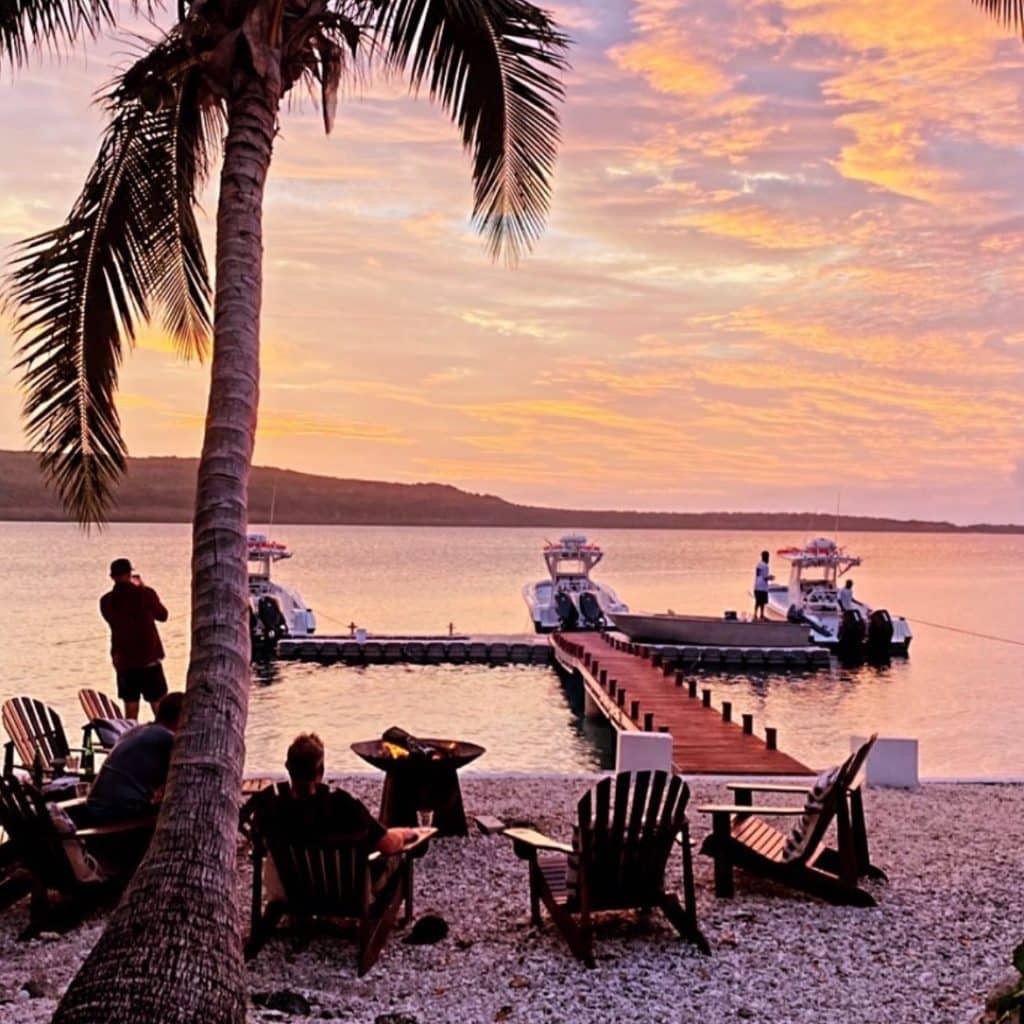
- Base: Trees and Fishes Private Retreat, Port Havannah — step from boat to private shoreline.
- Boats: 32-foot EdgeWater centre consoles with twin 300 Mercs; fast, stable, and rigged for bluewater.
- Gear: Durable PENN outfits for jigging, popping, light tackle, and game fishing.
- Dining: In‑house chefs, fresh island produce — sashimi minutes from the fillet table.
- Beyond fishing: Waterfalls, reef snorkelling, village culture, spa time — the full island experience.
When to Book and What to Expect
- Best window: Consistent action from early September; wahoo strong early, marlin and yellowfin strong through late spring into summer.
- Weather rhythm: Early starts for glassy runs; short tropical showers build toward December.
- Who it suits: Couples, crews, and solo anglers chasing premium bluewater action with resort-level comfort.
Planning Your Trip: Practical Notes
- Tackle vs supplied: Bring your favourite lures if you like; our PENN gear is dialled for the job, and breakages are rare.
- Techniques mix: Most trips combine trolling, casting, and jigging based on conditions.
- Flex to conditions: Captains pivot between edges, FADs, and seamounts — trust the read, that’s when the big days happen.
How to Plan Your Spring–Summer Trip
- Choose your dates within September–December
– Early spring for wahoo; late spring–early summer for blue marlin and yellowfin.
– Target water temps around 27–29°C.
Read more - Pick your adventure package
– Choose couples or blue water packages; look for seasonal bonuses.
See packages/offers - Lock in accommodation at Trees and Fishes
– Garden Retreat, Waterfront Suites, Luxury Pool Suites, or villas.
Explore the retreat - Decide your target species and techniques
– Marlin/wahoo: mixed trolling spread + teasers.
– GTs: poppers/stickbaits along bommies and ledges.
– Dogtooth: jig or live bait on drop-offs and seamounts.
Read more - Confirm boats and gear
– 32’ EdgeWater centre consoles with twin 300 Mercs.
– PENN gear supplied; BYO favourite lures optional.
Read more - Book with the Ocean Blue team
– Share dates, group size, target species; we tailor the program.
Enquire/Book
FAQ
September to December with stable 27–29°C water and consistent blue marlin along drop‑offs and current lines.
Yes — early spring often finds wahoo thick on the edges; high‑speed trolling produces reliable bites.
Absolutely. Warmer reef shallows trigger aggressive GT surface bites along bommies and ledges.
No. Ocean Blue provides durable PENN gear for jigging, popping, and game fishing; bring personal favourites if you wish.
Trees and Fishes Private Retreat in Port Havannah — private shoreline, in‑house chefs, and easy boat access.


